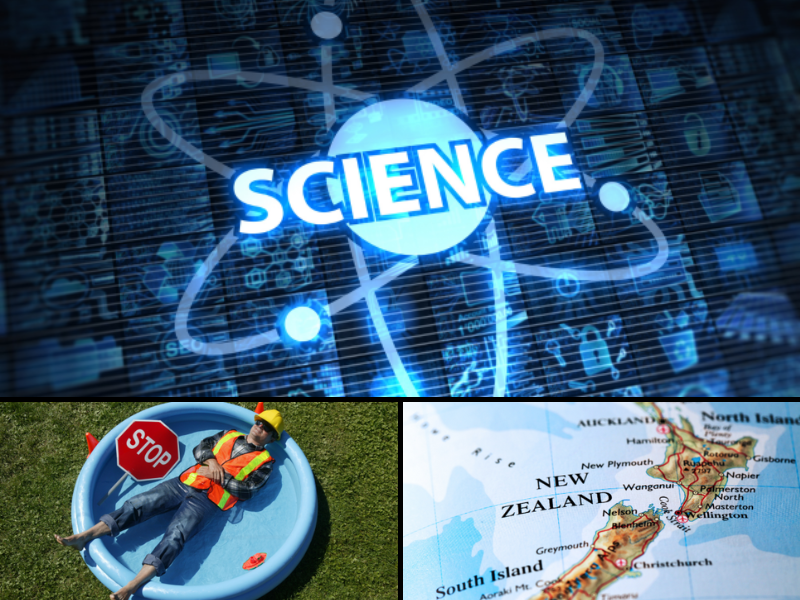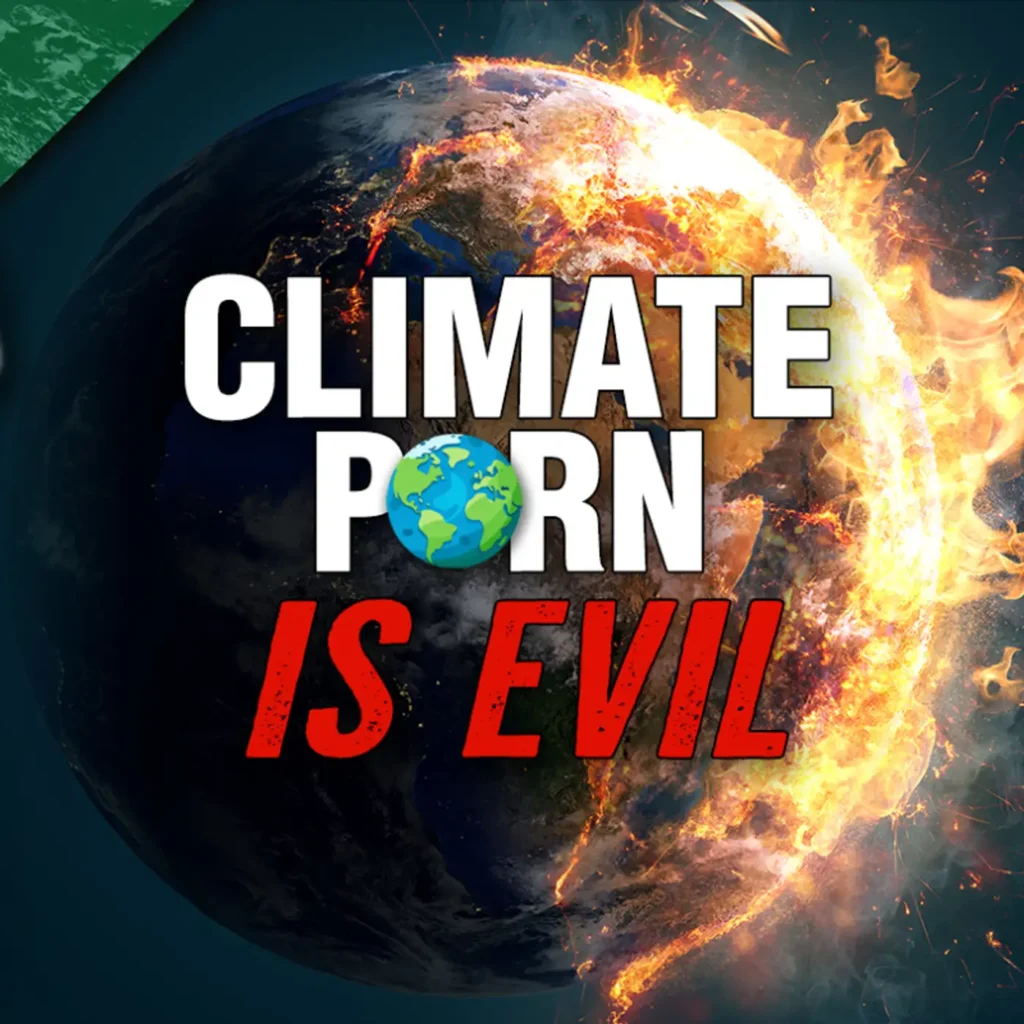IN THIS ISSUE:
- ‘Settled Science’ Is Getting Unsettled as Government Support Wanes
- Adaptation Can Overcome Any Climate Change-Related Heat Problems
- Despite Titular Climate Commitments, New Zealand Is Reembracing Fossil Fuels

‘Settled Science’ Is Getting Unsettled as Government Support Wanes
For nearly four decades, scientists with a reputational and financial stake in the game and compliant, uninquisitive mainstream media have told the public one thing consistently about climate change: there is a consensus, there is no debate, human greenhouse gas emissions are causing dangerous climate change. The end; roll credits; The Science is settled.
In the early years after the consensus that the “science is settled” was first proclaimed, real scientists—those who recognized science is a method, a way of explaining phenomena and discovering facts, not a conclusion set in stone for all time—objected to this claim and fought to be heard. They had some early successes in public debates, and when the media were still open to discovery they were sometimes included in reports as offering an educated opposing position on one climate change claim or another.
About 20 years ago, however, that began to change. As was revealed in the Climategate emails, influential climate alarmists moved to shut down debate and discussion about the causes and consequences of climate change by having openminded journal editors removed from their positions or reined in by journal publishers (nefarious activity that continues to this day, unfortunately). Climate skeptics were increasingly shut out of the peer-review process, and it became it nearly impossible to get papers openly skeptical of the anthropogenic climate disaster narrative published in top journals.
The media shut dissenting voices out of climate change stories, following the lead of prominent politicians who made their careers bloviating about the dual dangers of climate change and free speech with regard to the narrative that humans were causing disaster. Since the science was settled, the debate was over, and publishing the views of climate skeptics or climate realists was tantamount to allowing Holocaust deniers a voice in stories about concentration camps, the mainstream media followed the demands of climate alarmists and stopped reporting any scientific questioning of the consensus. Those not in the consensus camp were labeled climate deniers and banned from polite company even though the “denier” camp covered a range of views from extreme (climate change wasn’t happening) to lukewarm (climate change is happening, humans are possibly to blame, but it is not a crisis and could even produce positive outcomes).
Groups like The Heartland Institute were increasingly rare as outlets for sound science grounded in evidence, data, and the scientific method, developing documents and publishing peer-reviewed research that questioned the purported consensus. The documents included multivolume tomes contributed to or reviewed by hundreds of researchers and comprising hundreds to thousands of pages of comprehensive reviews of the literature demonstrating recent climate changes aren’t historically unusual and don’t portend an existential threat to humanity or the Earth as we know it. We also published shorter, concise pieces, easily accessible to any openminded layperson. Some documents explained why there continued to be disagreement in the scientific community about the causes and consequences of climate change. Others were in the form of short, one- to three-page documents packed with data and graphs showing that weather wasn’t becoming more extreme and fewer people than ever before were dying as a result of weather or changes to the climate supposedly caused by humans, media headlines to the contrary.
We are and remain David facing the Goliath of a grossly well-funded climate consensus cabal backed by people with true power.
As an active participant in this struggle, at various times in public fora online, on air, and in live debates or discussions on stage I have asked upholders of the consensus why, since the science was settled, we shouldn’t just stop funding climate science research. After all, we knew all the answers: the science is settled. Moving from the theoretical to the practical should be the order of the day if they were right, focusing all funding on mitigating or adapting to climate change. If we know for sure lives are at risk from climate change, let’s focus laser-like on strategies to mitigate or prevent climate change and quickly implement methods and deploy technologies to reduce the impacts of climate-related harms and build resilience to climate change.
They did not embrace my suggestion. Instead, sometimes sputtering and with shocked and alarmed expressions, they would respond with something like, “Oh no, we can’t stop funding climate research. While it is clear humans are causing dangerous climate change—of that there is no room for debate—we still need to understand just how bad it could get. The fine details still need to be defined to be clearer on the direction of various potential impacts.” My response—that we should just act on the assumption that any or all floods, wildfires, hurricanes, and any amount of sea level rise was due to climate change and get on with policies and projects to reduce the harm from such events—they condemned as outrageous.
It seems the fundamental, theoretical science is settled, as far as they are concerned, unless or until funding becomes an issue. Then there are still open questions that only they can answer, and only with continued funding.
Since climate change was first raised as an issue (some alarmists argue it’s “the issue”) of public concern, every president and most politicians played the “I’m not a denier” game. There were true believers, of course. Then there were those who, while possibly having personal doubts about the extent of the dangers of climate change, saw public action to prevent climate change as a great lever to seize more power over peoples’ personal lives and the economy.
Most skeptical politicians were cowed into silence. Others begrudgingly acknowledged climate change as a threat, “I believe too, but,” only to debate or argue that the policies proposed were too expensive, unworkable, or draconian. They’d do anything not to be labeled a denier, yet that didn’t save most of them from being labeled as such. If you weren’t all-in on dramatic climate action, you were a denier, with your head firmly stuck in the sand. There was no room for disagreement.
A few, very few, politicians stood strong for real science and rejected climate alarm, willing to withstand the opprobrium that being labeled a climate denier brought them in the circles of power and politics. Among these were former Sen. Jim Inhofe (R-OK) and former Rep. Lamar Smith (R-TX).
There we stood, until the rise of Donald Trump as an unconventional politician and eventual president who proclaimed climate change a hoax. With the onset of Trump’s second term, armed with knowledge of the swamp’s workings against his agenda in the first term, Trump and his team hit the ground running, and concerning climate change that meant pulling the rug out from under the institutional edifice that had embraced the climate alarm consensus: participation in international climate agreements, restrictions on fossil fuel development and use, tax credits and permits for wind and solar power, and most of all, direct funding for climate efforts.
For the first time in more than a decade, climate alarmists must seriously engage with climate realists on climate science questions. Recently, the U.S. Department of Energy’s (DOE) release of “A Critical Review of Impacts of Greenhouse Gas Emissions on the U.S. Climate,” by a group of prominent scientists including John Christy, Ph.D.; Judith Curry, Ph.D.; Steven Koonin, Ph.D.; Ross McKitrick, Ph.D.; and Roy Spencer, Ph.D., has forced alarmists to address realists’ longstanding questions, concerns, and critiques of the argument that humans are causing dangerous climate change, rather than dismissing them out of hand because the “science is settled.”
The DOE report, among other things, debunks claims that climate change is causing worsening extreme weather events, discusses why rising carbon dioxide (CO2) levels have a decreasing influence over global temperatures, and how the same increase in CO2 is causing a beneficial global greening, and it examines the myriad currently poorly understood natural factors that complicate attributing rising temperatures and changes in climate to human energy use.
Alarmists were shocked and outraged by the report’s release, especially as it is an official report issued by the same federal government which they have for decades relied on to unquestioningly fund their doomsaying research. Their stature as the official authorities on and purveyors of climate truth has been challenged.
The authors of the report had stature, had worked in the field, and had been given awards for their work in the field for decades, so alarmists couldn’t easily dismiss them as partisan or uninformed deniers.
The “consensus” climate science cabal now has to respond to the report’s claims, and because of that the report has stature and must be engaged with rather than shut out—a position the consensus group hasn’t seriously been in for more than a decade.
As importantly, as they engage, some are having to admit the report has at least a modicum of validity. It makes important points, which means the science is not “settled” after all. It never was!
“Predictions of global warming are uncertain,” writes Tim Plamer, D.Phil., in a recent article in Nature. “That’s why we need to keep finding out how the climate system works.”
Among the topics Palmer admits the authors of the DOE report are correct about is that climate change is not catastrophic and that “the most important uncertainty in our ability to predict how much global temperatures will increase as carbon emissions continue is related to how cloud coverage will change over time.”
Palmer’s admission is at least an opening, an admission that on the most critical question in the climate debate—the response of global temperatures to CO2 emissions—there is no certainty; the science is not settled. If we don’t know how much temperatures might rise, we can’t really know anything about how the climate will respond or whether humans or the environment are in fact in danger.
Let the long-overdue discussion or debate begin, and let it be done based on data and evidence, without any further acrimony, ad hominem dismissals, appeals to authority, or claims of consensus. That’s how it should have been all along. Politics and the quest for power and money should not be factors in science, although I’m not naive enough to believe they won’t continue to be so.
Sources: Nature; U.S. Department of Energy

Adaptation Can Overcome Any Climate Change-Related Heat Problems
Research published in the journal Nature confirms what many climate realists have long argued: adaptation is the best response to climate change, whatever the cause or direction it takes. As was argued in a paper I edited nearly 20 years ago, “Living with Global Warming,” and in many papers since then, adaptive responses are more likely to produce tangible, beneficial results than trying to prevent some harm indirectly by limiting greenhouse gas emissions to prevent climate change.
The Friends of Science summary of the new paper briefly describes the scope of the research and its conclusions:
[The paper] analyzed mortality, temperatures and electricity use to investigate the adaptation to heatwaves in Europe over the period 2000 to 2022. The paper found that Europeans can tolerate an additional 1°C of temperature rise every 18 years without an increase in mortality. Increasing economic output enabled tolerating each additional 1 °C due to a per capita GDP increase of 20 thousand euros, most likely due to greater air conditioning affordability. The study emphasizes the importance of economic growth and reducing energy poverty for reducing heat-related mortality. The analysis included 85 regions across 25 countries that had complete data across all required variables.
The study’s authors note that long-term studies, enormous in scope and breadth, have shown a decline in actual heatwave deaths, with other studies showing substantial declines in temperature-related deaths in general.
To determine the reason for the decline, the scientists compared Eurostat weekly mortality data with economic indicators, Copernicus temperature data since 1950, and ENTSO-E electricity demand data. Analyzing “mortality patterns during weeks with daily temperatures exceeding 22 °C for 2000–2022,” they found,
Europe outpaced climate change, with the capacity to tolerate an additional 1 °C rise every 17.9 years [95% CI 15.3–22.7]. Extending the temperature indicators beyond the prior 3 years did not enhance predictive accuracy, suggesting swift adaptations and historical climate lacked any predictive value. Additionally, increasing economic output, likely driven by infrastructural improvements, especially greater affordability of air conditioning, enabled tolerating each additional 1 °C due to a per capita GDP increase of 19.7 thousand euros [95% CI 14.6–30.3]. Consistently, the increase in cooling energy demand was the strongest in eastern Europe. The findings shed light on the mechanisms driving the observed reduction in heatwave mortality despite the warming climate trend, offering a more plausible basis for extrapolation than assuming a lack of adaptation. The model emphasizes the role of long term economic growth and addressing energy poverty.
This is the second time in a month that I’ve covered research that shows air conditioning saves lives. Even the International Energy Agency agrees.
Despite the clear evidence of the lifesaving benefits of air conditioning, donkeys in the French government are actively suppressing the adoption of widespread air conditioning in France. It seems that for the French left, fealty to right climate thinking is more important than actually taking steps to save French lives.
Sources: Nature; Friends of Science; Climate at a Glance

Despite Titular Climate Commitments, New Zealand Is Reembracing Fossil Fuels
It seems New Zealand’s government is reconsidering the benefits and costs of cutting carbon dioxide emissions in the face of fast-rising energy prices on the back of investments in wind and solar energy to hit net zero.
“New Zealand’s government has voted to resume oil and gas exploration despite an outcry from the opposition and environmental groups who argue the reversal will lay waste to the country’s climate credentials,” reports The Guardian. “In 2018, the Jacinda Ardern-led Labour government banned the granting of new offshore oil and gas exploration permits as part of its plan to transition toward a carbon-neutral future.
“But on [July 31], the ruling right-wing coalition voted to reverse the ban after the third and final reading of the crown minerals amendment bill—a move it believes will alleviate energy shortages and high energy prices. The bill passed by 68 votes to 54,” wrote The Guardian.
Simon Watts, New Zealand’s climate and energy minister, speaking in support of the bill to restart oil and gas development, told Parliament,
Kiwis shouldn’t have to choose between heating their homes or buying food because of rising costs. New Zealand is a country blessed with its renewable energy system, with around 92 percent of our electricity production today coming from renewable sources; however, we are faced with difficult trade-offs.
We have an electricity shortage and our generation does not always provide the certainty we need. …
The ban sent a chilling message to the investment community, halting the very exploration that underpins our energy security and leading directly to the supply constraints and price volatility that we see today.
In times where renewable production decreases, it is clear that we need contingency options to ensure that Kiwis are not left footing a bigger bill, and to ensure that we have sufficient supply. …
We are facing an important moment in how we manage our energy now. Our current gasfields are in decline. We are having to compensate by importing overseas coal, rather than using domestic gas. Without more investment in existing and new fields, constraints on gas supply will continue. The consequences are already being felt. Businesses are dealing with high energy costs, our businesses are facing closure, and our communities are suffering job losses.
This action is just one of several moves the ruling coalition has implemented in the past year to free up traditional industries and fossil fuel development. In 2024, the government passed a law to expedite new infrastructure development, including mining. It also pulled the country out of the international Beyond Oil and Gas coalition committed to phasing out the use of fossil fuels.
Attempts to reach net zero have consequences in terms of energy supply, costs, and politicians’ electability. It seems that when push comes to shove, New Zealand’s ruling coalition is unwilling to pay the potential electoral costs, at least.
Sources: The Guardian; New Zealand Parliament





